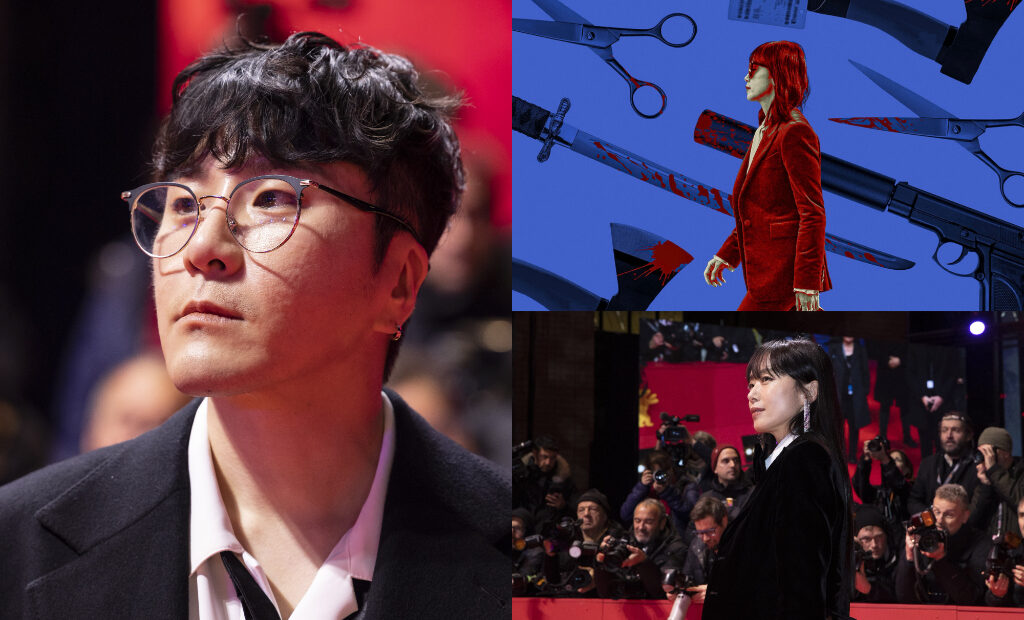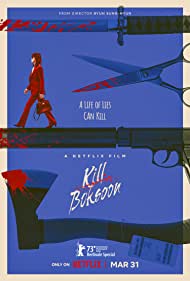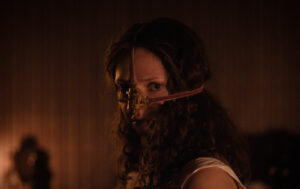“Aside from killing, what is the worst human act?”: Byun Sung-hyun and Jeon Do-yeon on Kill Boksoon at Berlin Film Festival 2023

After an energetic big-screen debut at this year’s Berlinale, the South Korean actionfest Kill Boksoon will jump straight to the small screen with the film being released as a Netflix original. Renowned Korean actress Jeon Do-yeon branches out into gloriously chaotic action, as the titular Boksoon considers whether killing for money is still all it’s cracked up to be, wondering if she should trade the physical violence of killing for money for the emotional violence of mothering a teenager. The Upcoming met with Jeon Do-yeon and writer-director Byun Sung-hyun shortly before the film premiered in Berlin.
Do-yeon, you were injured while filming an action scene and had to go to hospital. How physically demanding was Kill Boksoon to shoot?
Jeon Do-yeon: This is my first action film, so I really wanted to do it well – and having to carry an action film as a female lead, there was definitely a huge amount of pressure put on me. I think I wanted to overcome the general public’s perception of, “Hey wait, Do-yeon’s in an action film?” and I really wanted to do my best, so I really put in a lot of me. Every time I was a little bit insecure, or I thought it was too challenging or too physically demanding, including things like the injury, I constantly told myself, “I will not give up”. And the reason I wanted to do that without giving up is because I wanted to make sure there were no regrets after I was done. And again, I wanted to overcome people saying, “Hey – I don’t think she’s gonna do a great job as an action film lead”. I wanted to challenge that.
Sung-hyun, was it difficult to put together action scenes that would be fresh and new for your audience?
Byun Sung-hyun: The way you phrased your question, did you think that our action sequences were something fresh and new?
Yes. Particularly the final sequence.
BSH: This is my first action film. I’ve done a little bit in the film noir genre, but that wasn’t an aggressive action film, so I referenced a lot of action films – so that I could avoid them, rather than copying any kind of action sequences. But, then again, there are limitations to what we can create. So I thought to myself, if it had to be similar, at least let’s twist it to the best of our abilities. And so we watched a lot of other films during the pre-production period, and the martial arts director and I had a lot of meetings, and I believe I changed the storyboard for that last action sequence about eight times. Even after we changed it, I would have the martial arts director kind of act it out on-set, and then he would make changes – saying that something else would be better or whatnot. After we made those changes on-set, we would have the actors go into practising it and training for it right away. So we kind of went through those back-and-forth processes.
Global audiences seem to have fallen in love with Korean content in recent years – as if all things Korean surged in popularity during the pandemic. With your film being released by Netflix, was there much thought about targeting an international audience?
BSH: When I first wrote the script, I wasn’t actually thinking of it being a Netflix film. I was thinking of a theatrical release, and there was Covid, yes, and the pandemic had a little part in that (popularity of Korean content), but I personally think that, yes, it’s true – Korean content is all the rage. It’s very trendy right now, and we have a lot of Korean actors that have made a name for themselves overseas. I think, however, when Netflix approached and offered to do this with me, the reason I accepted it was because I wanted to showcase the very best performers in Korea through this film. I was thinking, “Let me show you the real number ones.” While it is true to some extent that the popularity of Korean content is opening more doors for other people, that’s not something that I personally place too much significance on. And the reason for that is because when you look at the globally loved films, some are obviously really great, and there are some that are, honestly, not my cup of tea, and so I don’t really like to think about those things as I create my films. If it’s loved by the global audience, that’s great, that’s amazing, but it’s not something that I want to think about ahead of my work. And this is something that Do-yeon mentioned in another interview, but I believe that recent developments are going to raise the bar in terms of quality for Korean content going forward, and I not only believe it’s going to happen, I believe it should happen.
What made you choose killing as the profession for the protagonist, and are there any female killers in film that inspired the creation of Boksoon?
BSH: I chose killing because it’s the drastic, if not exact opposite of raising a child. It’s obviously unethical – probably the worst crime that humankind can commit. However, you may have noticed that in our film, in the universe that we built in our film, the worst possible thing a human being can do isn’t really killing. And so I wanted to pose the question: aside from killing, what is the worst human act? So you could almost say that, in terms of the ethics that are portrayed in our film, it’s more about, aside from killing, when you look at your own life, can you honestly tell me that there’s nothing to be ashamed of? I think that’s the question I wanted to pose, and that is the reason why there is a growing distance between the mother and daughter, and what also leads to the resolution of that dilemma, that opens a new door for their relationship to become closer. And I hate myself for saying this because it’s so cliched, but it’s Uma Thurman in Kill Bill. And I’m ashamed again, because it’s so expected.
JDY: Again, I’m ashamed, because it’s the only female killer character I can think of – in Kill Bill.
Is it true that the two of you developed the character together?
BSH: I actually observed Do-yeon up-close, and I only substituted the occupation of the character from her being an actor to Boksoon being a killer. I have no experience in raising a child – I don’t have a child – and I wanted to see her in her motherly element. I wanted to see what it was like for her to be a mum, and I was very grateful that she had me over to her house, and I would watch her and her daughter play card games, play board games, just having a regular conversation as mum and daughter. I saw them at their best, and I also saw them when there was a little conflict between them. We had many, many conversations when I first finished the first draft of the script; Do-yeon was actually working on a drama series, so I went to her to meet up at her office after I finished the final version, and I told her that some lines… I feel a little iffy about them not really sounding like a true mother. So I remember we had this session, it went on for about five to six hours, where I had my laptop open, and she would do improv as a mother, and she came up with some amazing lines that ended up being in the final version of the dialogue – some even verbatim, especially in the scenes where she’s speaking with her daughter.
Oliver Johnston
Photos: Sandra Weller/Berlinale 2023
Kill Boksoon is released on Netflix on 31st March 2023.
Read more reviews from our Berlin Film Festival 2023 coverage here.
For further information about the event visit the Berlin Film Festival website here.
Watch the trailer for Kill Boksoon here:




























Facebook
Twitter
Instagram
YouTube
RSS